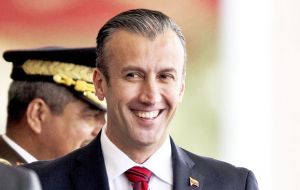MercoPress. South Atlantic News Agency
Venezuelan vice-president publishes full page in New York Times rebuking drug trafficking charges
 El Aissami's letter, addressed to Steven Mnuchin, the recently appointed US Treasury secretary, rebuts the drug-trafficking accusations
El Aissami's letter, addressed to Steven Mnuchin, the recently appointed US Treasury secretary, rebuts the drug-trafficking accusations  Responding to sanctions against El Aissami, Maduro said, “They are not attacking Tareck, they are attacking a country, a revolution and I am the final objective”.
Responding to sanctions against El Aissami, Maduro said, “They are not attacking Tareck, they are attacking a country, a revolution and I am the final objective”. Tareck El Aissami, the recently appointed vice president in Venezuela, took out a full-page in The New York Times on Wednesday to rebuke sanctions against him and other Venezuelan officials leveled by the US government over drug trafficking charges. El Aissami, who was named alongside an alleged associate, was declared by the US Treasury Department to be a specially designated narcotics trafficker for allegedly “playing a significant role in international narcotics trafficking.”
He is accused of being a part of a network of military and government officials who, with others, have facilitated the transshipment of narcotics through Venezuela to destinations in the US, Europe, and elsewhere.
El Aissami's letter, addressed to Steven Mnuchin, the recently appointed US Treasury secretary, rebuts these drug-trafficking accusations, chalking them up to partisan political motives:
“First, in your capacity as [Office of Foreign Asset Control] Authority you have been deceived by political sectors, lobbyists and stakeholders in the US, whose essential interest is to prevent that the United States and Venezuela restore their political and diplomatic relations on the basis of mutual recognition and respect.”
“These stakeholders not only lack any evidence to demonstrate the extremely serious accusations against me, but they have also built a false positive case in order to criminalize —through me— the Government of the Bolivarian Republic of Venezuela, a country that is decidedly waging a war on transnational drug trafficking business.”
El Aissami cites as evidence of this fight against drugs the apprehensions of drug traffickers made by Venezuelan authorities during his time as interior minister under late President Hugo Chavez from 2008 to 2012, a number of whom were extradited to the US and Colombia.
He also cites the increase in the average annual amount of cocaine seized by Venezuelan authorities between 2005 and 2013 over the average yearly amount of the previous six years, when the US Drug Enforcement Administration was operating in the country.
“This figure by itself shows the lack of commitment of DEA to fighting drugs trafficking, and upholds the very well documented assertion of the connections between that U.S. Agency with the criminal drug organizations,” the letter states.
Aissami also refers to Venezuela's policy of shooting down suspected drug planes detected over its territory. The country has brought down over a 100 aircraft under this policy, the letter says. Drug-plane shoot-down policies are risky and have led to international incidents in the past.
Planes shot down over Venezuela have been found to be carrying cocaine, but in other cases, the evidence justifying the shoot down and source of the authorization for it have been murky.
“But beyond any political and geopolitical considerations, OFAC's decision constitutes a serious violation against my human rights and seriously damages my dignity and honor,” El Aissami states in the letter. “I have led my personal, professional and political life in my country, which I love deeply and to which I devote my life through a political project whose supreme objective is the happiness of our people, equality and social justice.”
“I have no assets or accounts in the United States or in any country of the world, and it is both absurd and pathetic that an American administrative body —without presenting any evidence— adopts a measure to freeze goods and assets that I do not own at all.”
El Aissami also cites what he calls the failure of the US-led war on drugs at home and abroad, calling on the US government to “rethink” and “rectify” policies he says have violated international law and human rights and abetted or empowered criminal actors.
El Aissami has been called the “narco of Aragua,” referring to the state he was governor of from 2012 to 2017, because of suspicions he has used his official connections to facilitate the trafficking of drugs from Colombia through Venezuela's air and seaports.
Drug traffickers arrested in the region have said they had links or made payments to Venezuelan officials and others with ties to El Aissami. Other Venezuelan official sanctioned or indicted by the US over drug-related offenses have been placed into higher-ranking positions within the Venezuelan government, in a move some see as an effort by embattled Venezuelan President Nicolas Maduro to bring on officials with interests in defending his administration.
Responding to the sanctions leveled against El Aissami, Maduro said, “They are not attacking Tareck, they are attacking a country, a revolution and I am the final objective”.
It is estimated that a full page ad in The New York Times costs above 100.000 dollars.




Top Comments
Disclaimer & comment rules-

Read all commentsVenzla,
Feb 25th, 2017 - 03:53 am -1“We don't care what the US thinks !”
Oh wait. Yes, yes you do. :-)
Commenting for this story is now closed.
If you have a Facebook account, become a fan and comment on our Facebook Page!